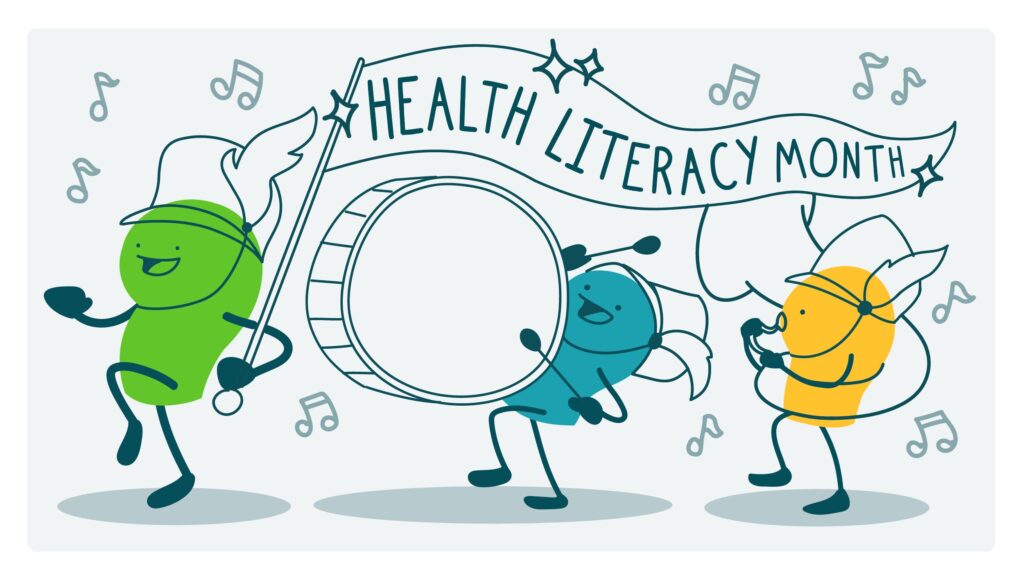
Dear readers, it’s our favorite month of the year: Health Literacy Month! This month is the perfect time to reflect on how far our field has come and look ahead to the future of health literacy.
Ten years ago, health communicators focused on making patient education materials clearer and websites easier to use. As technology evolves, we’re finding new ways to meet people where they are. Today, people are asking ChatGPT for medical advice, scrolling TikTok for health hacks, and trying to make sense of the numbers on their smartwatches. Tomorrow? Who knows — maybe your fridge will remind you to drink more water (in plain language, we hope!).
Whether people get their health info from a handout, a social media post, or a holographic projection, the “why” of health literacy will stay the same: helping people feel supported, informed, and confident in their choices. But the “what” — the tactics, tools, and focus areas — will keep shifting as the information landscape evolves.
So what might the future hold? We have a few predictions.
Tech will need a health literacy upgrade
Wearables, apps, and smart devices will continue serving up streams of data, but the real challenge will be making that data meaningful. After all, “Your heart rate is normal” is a much more useful message than “72 bpm.” At the same time, generative AI will keep churning out health content at lightning speed. The future role of health literacy will be to help people discern what’s trustworthy — and to help technology elevate credible sources. And as chatbots and virtual assistants become everyday fixtures, they’ll need more than just the right answers: they’ll need plain language, cultural humility, and transparency if they want to earn people’s trust.
Trusted messengers will matter most
Even in a high-tech future, people will always look to trusted messengers for guidance. That could mean a nurse using the teach-back method, a public health leader communicating clearly during a crisis, a faith leader sharing health updates with their congregation, or family members helping each other sort through online advice. What unites all of these messengers is empathy, credibility, and the ability to make information feel usable. Technology can amplify the voices of trusted messengers, but it can’t replace them.
Systems will (hopefully) get simpler
Digital literacy has become inseparable from health literacy. After all, if you can’t log in to a patient portal, interpret your lab test results on that portal, or complete an online benefits application, you’re shut out of essential services. The challenge for the future is to make these systems intuitive, accessible, and equitable — designed for the people who rely on them, not just the organizations that run them. That means plain language, human-centered design, and ongoing testing with real users, not just check-the-box compliance.
Health literacy will keep expanding its reach
The skills we sharpen in health literacy — evaluating, interpreting, and acting on information — apply far beyond health care. They overlap with media literacy (spotting misinformation) and digital literacy (navigating online tools). Together, these literacies help people cut through the noise, decide what to trust, and take action with confidence. At its core, health literacy will keep asking the same question: How do we empower people through communication?
The future of health literacy isn’t just about clearer pamphlets or better websites (although those still matter, of course!). It’s about helping people sort, discern, and act on information in a world that’s noisier than ever. And it’s about helping technology do the same — validating and elevating trustworthy information so people don’t have to go it alone.
The bottom line: The tools of health literacy will change — from plain-language pamphlets to AI, apps, and everything in between. But the mission stays the same: to build trust, meet people where they are, and make information something people can actually use.
Copy/paste to share on social (and tag us!): This #HealthLiteracyMonth, CommunicateHealth predicts the future of #HealthLiteracy. Spoiler alert: It’s still about helping people access, understand, and use health information. Read more in this week’s post: https://communicatehealth.com/wehearthealthliteracy/the-future-of-health-literacy/
Browse recent posts